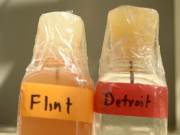A group of environmentalists from New Jersey made a four-mile trip to Duck Island to protest a power plant’s alleged water pollution, but they didn’t take the ferry.
According to the Courier-Post Online, members of the New Jersey Sierra Club, Environment New Jersey, and other activists left Bordentown Beach at 12:45 p.m.to embark on a trip to nearby Duck Island, home of the PSE&G power plant.
They decided to ride kayaks in a show of solidarity, which also enabled them to paddle right up to the dock of the power plant. Activists held signs in protest of the plant’s water pollution, which is being attributed to their lack of water cooling towers.Protesters want the state to force PSE&G to install the cooling towers to lower the temperature of river water used in power generation. The superheated water contains dangerous contaminants that are killing endangered fish, driving many to near-extinction.
“We are here today to paddle into action to force the (Department of Environmental Protection) to do its job, which is to protect the Delaware River, its fisheries and ecosystem,” said Sierra Club Executive Director Jeff Tittel.
“For far too long, the DEP has allowed the Mercer Generating Station to pollute the river, killing 70 million fish and other organisms a year, including 30 fish species.”
Cooling towers were developed to recycle more than 98% of wasted water, resulting in reductions in water and energy use, but they also play a role in keeping water safe for both fish and humans alike.
Despite their benefits, a recent health scare has put cooling towers and water treatment as a whole in the national spotlight. Pollution from Duck Island could easily spread to the DC area, and residents should be wary of the situation based on a recent Legionnaires’ Disease outbreak.
According to The New York Times, 12 people died of in the South Bronx during July and August after 15 water-cooling towers were found to be contaminated with bacteria containing the disease.
While one could say that this would create a debate as to whether or not installing cooling towers at PSE&G is the right course of action, Tittel and his peers think the benefits far outweigh the potential consequences.
He says that the plant is a “hazard” that pollutes the river with metals and other harmful contaminants, including arsenic, boron, cadmium, and mercury.
PSE&G spokesman Michael Jennings said that the company has “worked to maintain (their) reputation as good stewards of the environment.”
He also said that the utility has spent hundreds of millions of dollars on air pollution systems, adding that a screening technology has been installed that the EPA identified as the best method for reducing impact on wildlife.
As for now, it doesn’t seem as if any further regulations will be imposed on the power plant. For the time being, protesters find themselves heading upstream without a paddle.
























